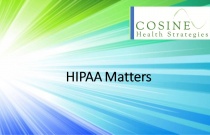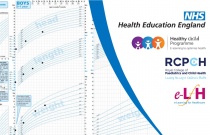Clinical Pathways: Ensuring the Right Patients Get the Right Care - Webinar
Dr Angus Ritchie
Using a structured renal pathway document to keep patients on the right track with the right care
Medication Calculation and the Quality Use of Medicines Quiz
Melanie Carstairs (Nursing Student, University of Newcastle), Melbourne Health, Royal Brisbane & Women's Hospital, Metro South Health Service District, Top End Renal Services, Southern District Health
An interactive quiz to test your medication and dialysis calculation skills
Does the Early Diagnosis of CKD Really Matter? - Webinar
Dr Tim Mathew
Does it really matter if we diagnose CKD early (or not) and can we make a difference?
Green Dialysis - Webinar
Professor John Agar
How to make your dialysis unit and dialysis practice more environmentally friendly
HIPAA Matters
Donn Kropp, RN, BSN
1.00 Hours
If you’re involved in the healthcare industry, then it’s a pretty safe bet that the requirements and regulations of “H” “I” “P” “A” “A”, which is often pronounced “hippa”, have affected your workplace and your daily routines and practice. You might not realize this, if you’ve never heard of HIPAA before, and you might not even k....
Management and Treatment of the Lower Extremity Wound
Medline University
1.00 Hours
In this course we will focus on the management and treatment of the lower extremity wounds, including the overall management of the patient, the disease process, and that of wound itself.
Management of Central Lines; Current Standards of Practice 2017
Capra Dalton
5.00 Hours
This course has been designed to provide basic conceptual and operational knowledge to healthcare clinicians responsible for the care of patients with central venous access devices. As the science of infusion therapy advances and technology expands, it is imperative that all healthcare clinicians and nurses practicing infusion....
Clostridium Difficile: Prevention and Management
Leah Frederick
4.50 Hours
Clostridium difficile is an inimitable organism that normally lives in the gut. When an antibiotic is taken to treat an infection, helpful or normal bacteria are destroyed, causing an overgrowth of the C. difficile bacteria. Clostridium difficile localizes to the large bowel, where it manifests as diarrhea and colitis. The sympt....
Hazard Communication
Kevin Stansbury
1.00 Hours
This course is designed to protect these workers exposed to hazardous chemicals in all industrial sectors, the Federal Government established the OSHA Hazard Communication Standard (HazCom) 1910.1200, also known as the "right to know" law. This standard is based on a simple concept: that the employee has both a need and a right....
Healing the Healer
Jill Ohara
1.50 Hours
Nurses give of themselves daily in large quantities. Yet, as experience has shown us they are the least likely to take care of themselves. To be in a position to care for others in a loving, healing way the provider must first look to their own needs. In this online continuing education course author Jill O'Hara will share all t....
Healthcare Bullying Solutions
Donna Krasowski
1.00 Hours
Many healthcare workers are subjected to bullying from co-workers, managers, physicians and/or clients. Bullying occurs in all sectors of health care and is a significant, under-reported occupational health and safety issue. Bullying has a profound effect on targets, witnesses, clients, health-care organizations and bullies them....
Medication Administration in the Correctional Setting
Lorry Schoenly
1.00 Hours
Administering medication is one of the most important … and one of the most risky...health care processes in corrections. Frequent legal and licensure issues surrounding medication possession and administration make this a nursing process of significant concern. Due to the secure environment of a correctional setting and the lim....
Drugs and Dysphagia Part 1
Peter Johnson and Lynette Carl Pharm.D, B.C.P.S.
0.25 Hours
The Drugs and Dysphagia video series is divided into three parts. Parts one and two discuss the medications affecting the central nervous system and dysphagia. This course is Part 1, a 2 hour video that provides a review of the central and peripheral nervous systems. This video course also provides an introduction to the pathoph....
Drugs and Dysphagia Part 3
Lynette Carl Pharm.D, B.C.P.S. and Peter Johnson
0.25 Hours
The Drugs and Dysphagia video series is divided into three parts. Parts 1 and 2 discuss the medications affecting the central nervous system and dysphagia. This 2 hr video, Part 3 of the course, looks at the medications affecting the gastrointestinal function. Instruction is given regarding the medications affecting gastrointest....
First Responders: Behavioral Health Concerns
Industry Specialists
1.00 Hours
First responders are usually the first on the scene to face challenging, dangerous, and draining situations, as well the the first to reach out to disaster survivors and provide emotional and physical support. This CEU course discusses the challenges encountered by first responders during regular duty as well as following disas....
Management of Oral Ulcerations
Martyn Ormond
This session aims to cover the common causes of oral ulceration, as well as the management options available in both general practice and the specialist setting.
Infection Prevention for Healthcare Professionals
Ruth M. Carrico, PhD, MSN, APRN, FNP-C, FSHEA, CIC
4.00 Hours
As delivery of healthcare becomes increasingly complex and locations where care is delivered more diverse, the challenges for providers of healthcare also become more substantial. Preventing acquisition and transmission of infection to patients, healthcare providers, and those in the community continues to be an area of focus am....
Legal Ramifications for Documentation
Marcy Jack, JD, BSN, CPHRM
1.00 Hours
The quality of infusion therapy is evaluated by the quality of the nursing documentation. Accurate and complete documentation is considered a professional standard of nursing practice. Documentation that is incomplete or not consistent with organizational policy, state regulations, or state boards of nursing can be used to suppo....
Implementing and Evaluating Smart Pump Technology
Pamela Phelps, PharmD, FASHP
1.00 Hours
The Institute of Medicine (IOM) reports that approximately 1.5 million hospital patients experienced, and are harmed by, medication-related adverse events each year. Half of these events are related to the use of infusion pumps. Infusion-related medication errors can result in serious injury or death. But, the development of "sm....
Maintaining Pediatric Vascular Access Devices
Theresa Reed, BSN, RN, VA-BC
0.75 Hours
Treatment methods for acutely ill children now include regimens that require frequent infusions. Central vascular access devices (CVADs) have become an important tool in the medical management of children. It is important for patients and their care providers to have an understanding of the intensity of maintenance required and....
Groupwork with Men Who Batter
Jeffrey Edleson, Ph.D.
1.00 Hours
Currently, there is wide variation in content, style, and length of batterer intervention programs, from small group treatment programs to universal prevention efforts. This CEU course focuses on the research on small group treatment programs for men who batter by first providing a brief overview of the history and current prac....
Group Therapy Treatment for Substance Abuse (Revised)
Philip Flores, Ph.D., COP, FAGPA, et al.; Substance Abuse and Mental Health Services Administration
11.00 Hours
Groups can support individual members in times of pain and trouble, and they can help people grow in ways that are healthy and creative. This CE course assists counselors in enhancing their therapeutic skills with regards to leading groups that are designed to promote recovery from substance abuse.
Evolutionary implementation of GS1 standards in the area of medical devices in the University Clinical Center in Gdansk, Poland
Mrs Joanna Nowak,
During this webinar mrs Joanna Nowak, master of organization and management, will share on the implementation of GS1 for medical devices in the Gdansk Hospital in Poland. In this hospital Mrs Nowak has been head of Medical Procurement Unit since 2001 and is responsible for supplies of medical devices for the University Clinical....
Intravenous Fluids
Andrew Toner and Paul Quinton
0.50 Hours
This session describes the use of crystalloids and colloids for acute fluid resuscitation.
Growth Charts and their Interpretation
Gary Butler Consultant and Professor in Paediatric and Adolescent Endocrinology
0.50 Hours
This session is an introduction to growth charts, and includes information on how to plot measurements and when to become concerned about a child's growth. This session was reviewed by Elaine Tabony and updated in February 2017.






















